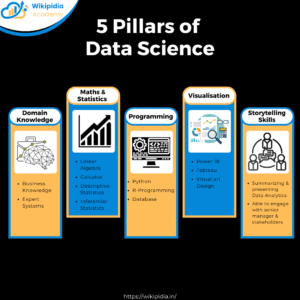In the era of information explosion, data has emerged as a driving force behind innovation, decision-making, and business strategies. At the heart of this revolution are data scientists, individuals equipped with the skills to harness the power of data and transform it into actionable insights. If you’re intrigued by the prospect of becoming a data scientist, this comprehensive guide will illuminate the path ahead, providing you with the knowledge and steps needed to embark on this exciting journey.

- Educational Foundation: Your journey as a data scientist begins with a solid educational foundation. While there’s no one-size-fits-all approach, a bachelor’s degree in fields like computer science, statistics, mathematics, or engineering is preferable. But it’s not necessary. Any graduate is equally eligible.
- Developing Essential Skills: Data science is a multidisciplinary field that demands a diverse skill set. Here are key skills that are integral to your success:
- Programming Proficiency: Mastery of programming languages like Python or R is essential for data manipulation, analysis, and modeling. These languages are widely used for their versatility and extensive libraries.
- Statistics and Mathematics: A robust grasp of statistical concepts and mathematical foundations empowers you to draw meaningful insights from data. Probability theory, linear algebra, and calculus are vital components.
- Data Manipulation and Analysis: Learning to clean, preprocess, and explore datasets is crucial. Proficiency in tools like pandas and SQL enables you to extract valuable information from raw data.
- Machine Learning Expertise: Understanding machine learning algorithms and techniques allows you to build predictive models, classification systems, clustering analyses, and more.
- Data Visualization: The ability to create compelling data visualizations is paramount for conveying complex findings to both technical and non-technical stakeholders.
- Leveraging Online Resources : The digital landscape offers a wealth of resources to augment your data science education. Wikipidia Academy provides access to a plethora of data science courses taught by industry experts. These courses range from fundamental concepts to advanced topics, and many offer the flexibility of self-paced learning, allowing you to tailor your education to your schedule.
- Acquiring Practical Experience : Practical experience is the bridge that connects theory to real-world applications. Here’s how to gain it:
- Personal Projects: Undertake personal data science projects to apply your skills and tackle real-world challenges. These projects not only deepen your understanding but also serve as invaluable additions to your portfolio.
- Participate in Kaggle Competitions: Kaggle, a platform for data science competitions, offers the opportunity to solve complex problems, learn from other participants, and hone your skills in a competitive environment.
- Internships: Internships or entry-level positions in data-related roles provide hands-on experience and exposure to industry practices. These opportunities allow you to collaborate with professionals, apply your knowledge, and build a network.
- Crafting a Robust Portfolio : A well-structured portfolio is a testament to your abilities and achievements. Include a diverse range of projects that highlight your skills in data manipulation, analysis, visualization, and machine learning. Each project should showcase your problem-solving prowess, methodology, and the insights you derived.
- Engaging in Networking: Networking is an essential aspect of professional growth. Attend data science conferences, meetups, workshops, and online forums to connect with fellow enthusiasts and industry experts. Engaging in discussions, sharing insights, and collaborating on projects can open doors to new perspectives and opportunities.
- Embarking on the Job Search: Armed with a well-rounded skill set and a compelling portfolio, begin your search for data science roles. Tailor your resume and cover letter to emphasise your relevant experiences and skills. Job titles to consider include Data Scientist, Machine Learning Engineer, Data Analyst, and more. Wikipidia Academy provides the best career opportunities to start your career in data science.
- Embracing Lifelong Learning : The data science field is characterised by rapid advancements. To remain competitive and relevant, commit to lifelong learning:
- Stay Updated: Follow the latest developments, trends, and breakthroughs in data science through research papers, blogs, and online communities.
- Continuously Expand Your Skills: Enrol in advanced courses and workshops to deepen your understanding of specialised topics like deep learning, natural language processing, and more.
- Contribute to Open Source: Engage in open-source projects to collaborate with the community, share knowledge, and enhance your coding skills.
- Experiment and Innovate: Dedicate time to experimenting with new techniques, tools, and approaches. Building your own projects can be an avenue for innovation and learning.
Conclusion : Becoming a data scientist is a transformative journey that requires dedication, perseverance, and continuous growth. By building a strong educational foundation, mastering essential skills, gaining hands-on experience, networking with peers and experts, and staying adaptable through lifelong learning, you’ll navigate the challenges and seize the opportunities this field presents. Remember, your contributions as a data scientist have the potential to shape industries, drive innovation, and unlock the hidden potential of data in our ever-evolving world.

